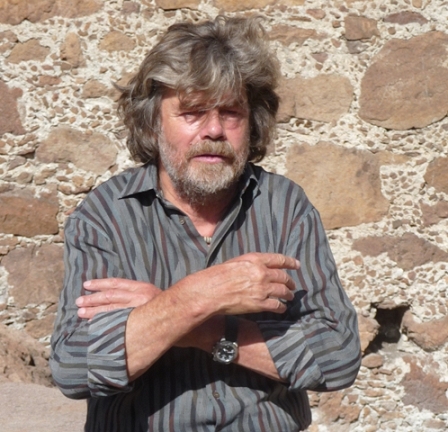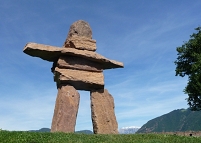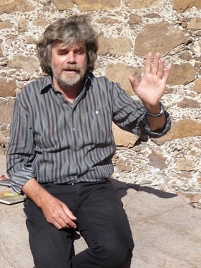Erstellt am: 2. 6. 2011 - 12:53 Uhr
"This is not Heidi Land"
“Everything that made the mountains charismatic has been largely taken away from us by people from the city”, says Reinhold Messner, the one-time genius climber and big mountain pioneer who has developed into a successful businessman, book author and into a polarizing influence in the South Tyrolean political scene.
Messner says current landscape of cable cars and major hotels has little to do with the mountain culture he celebrates in his five mountain museums dotted around the Alps. I meet him in one of those museums, the pinkish walled Schloss Sigmundskron that is perched over the ugly urban sprawl of Bozen. Squatting on a low stone wall in the late afternoon sun, Messner exudes that immense self-belief that helped him become the first man to summit Everest without the aid of supplimentary oxygen and which, in conversation, leads him on that slippery mountain path between single-mindedness and bloody-mindedness.

chris cummins
He has his vision of the future of the mountains but admits he hasn`t found many allies “I`m pretty much on my own now, but people`s thinking will change.” Firing his words out rapidly in a guttural Tyrolean accident so that his sentences seem like machine gun fire as he rails against the meddling of policy makers from the city, who he constantly refers to as Schwätzer a term probably best translated as “big mouths”.
“I think the major problem is that the people who live and work in the mountains get endless pieces of advice and from city-folk who don`t understand the mountains,” he says. The future of the Alps, both economically and environmentally, are decided by urbanites in the big cities in the flats such as Rome, Vienna or Brussels, he says, and too little attention is paid to the voices of those who have lived in the mountains for thousands of years and have shaped the landscape of the mountains through agriculture.

chris cummins
Messner has tried to shape opinion in those centres of legislation. He spent 5 years in Brussels from 1999 to 2004 on an Italian Green Party ticket and returned thoroughly disillusioned with the political process. He now says he only went because at the time injuries were preventing him from mountaineering and he sees his Brussels years as a fairly barren time. “What did I achieve? Well I got an inside view into how it all works.”
At one point in our conversation Messner announces himself an “anarchist” and he clearly holds politicians in low regard, emphasising several times that he is a man of action not talk, although he once said that if the world's leaders could spend a few days climbing a mountain together, then the world would get a better place. Now he says the urbanite men in suits are ruining the Alps and taking the destiny of the mountain regions out of the hands of those who have “the responsibility” to shape and protect their future – those, like him, who were born there as mountain people.
The man who climbed all the world`s 14 peaks over 8,000m without oxygen has revolutionised the history of mountaineering. He is one of the few people to deserve that much over-used hyperbole "living legend". He`ll turn 66 this year and now that his girth has broadened into middle-aged comfort, it`s his quite extraordinary mane of hair that still gives the mountaineering legend that imposing aura of vitality as he barks his thoughts at me. He looks like a grumpy lion and he almost growls at me when I bring up the subject of ecological sustainability of an Alpine agriculture that has changed so much over the course of the past half century. Messner might have gone to Brussels to represent the Greens faction, but he isn`t a fan of the green lobby. “Green groups are destroying the Alps because they don`t believe that agriculture and environment go hand in hand."
He says the people born in the mountains should get the chance to live and work there, "they will look after the environment. They`ll find an environmental model that works.” That doesn`t mean building more and more big hotels and more cable cars, he says, but it does mean allowing farmers their access roads to the alms so they can drive up their tractors, even if the tourists find them ugly. “This is not Heidi Land.”
That`s the second thing that really bugs Messner: the romanticizing of the Alps. He fears they have become something for outsiders to look at and climb up rather than the working environment of the indigenous population. Messner is horrified by the de-population of the rural Alpine regions as young people leave to find jobs in the cities and that is eroding the mountain culture.
Chris Cummins was travelling the Alps looking at Alpine Pearls - sustainable projects in the mountains.
According to Messner, the mountain farmers are the true heroes of mountain culture. It`s them and their work on the alms that have given the Alps the flair that has attracted and will continue to attract visitors and yet the ecologists and “big mouths” from the city want to impede their work with rules and regulations.
He is very scathing of city-dwellers mawkish enthusiasm for the Alps as romantic settings for vain adventures and, rather awkwardly for me, he holds the English primarily responsible for this snowballing phenomenon when the aristocrats of the 19th century branded the Alps the “playground of Europe.”

chris cummins
Surprisingly, perhaps, for a man who made his name as a mountaineer he is an opponent of the mountain huts that service this “playground” high-altitude hiking. Mountaineering is a serious business for Reinhold Messner and he clearly has little time for amateur enthusiasts of his trade. "High-altitude climbing is about suffering, it's about being afraid." It`s not about sport. That sort of talk won`t please tourism planners and might sound harsh until you consider Messner`s biography. This is is a man who lost his brother not to mention seven toes on a disastrous expedition to Nanga Parbat in which he says he was confronted with the reality of his own mortality. Human beings, he says, have used the Alps over centuries to a height just above the tree-line. Above that height, perhaps of around 2,500m, we should leave the mountains to the elite experts - the “serious mountaineers” like him, while the lower slopes should be used for agriculture.
It seems sentimental to suggest that agriculture combined with soft tourism can save the Alps economically and when it comes to the sort of sentimental Alpine romanticism that Messner describes as “Heidi Land”, I can think of nothing more likely to fit the description more than agritourism or “Urlaub am Bauernhof”. What could be more misleading than waking up late in freshly laundered sheets and pretending you live on a farm? But it turns out that Messner is a fan and runs two himself because, he says, they provide a workable solution to combining traditional Alpine culture with profitable tourism.
Messner in interview
Dieses Element ist nicht mehr verfügbar
For Messner the survival of this culture is the key issue. “The city folk shouldn`t come here and tell the mountain communities how to rescue the Alps. If we can protect our mountain way of life we can protect the mountains. That`s true of mountain people in all regions of the globe.”
And with that, and a short shake of hands, probably dismissing me as a Flatlander, Messner stalked off into the South Tyrolean sunshine.


